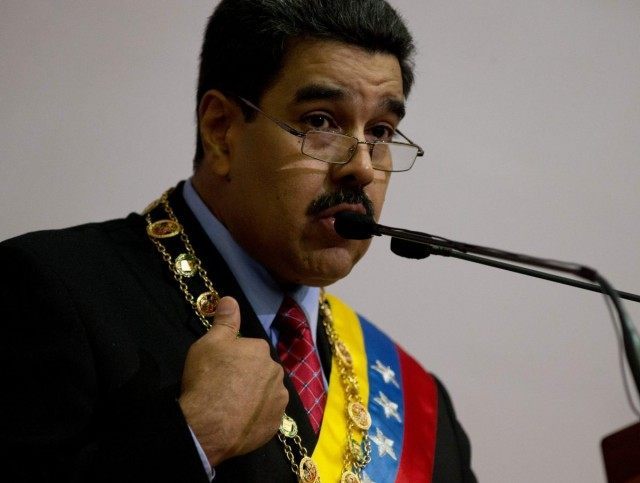Nicolás Maduro, the President of Venezuela, has announced an “economic state of emergency,” allowing him to rule by decree, in yet another attempt to diminish the power of the nation’s legislature ruled by the opposition anti-socialist party for the first time in 17 years.
Maduro announced a 60-day “economic emergency,” beginning on Friday, which will allow Maduro to override any attempt by the legislature to liberalize the strictly socialist Venezuelan economy. The decision followed the release of official economic data for the first time in more than a year, showing Venezuela’s rampant inflation problem and warning of even worse economic decline. The government estimates the national inflation rate at 141.5 percent.
This number, experts say, is significantly smaller than the actual inflation rate in Venezuela, which the socialist government is trying to hide. Alejandro Werner, Latin America regional director for the International Monetary Fund, noted that the IMF’s official studies found that Venezuela’s inflation rate in 2015 reached 270 percent, and IMF estimates show the nation has the potential to reach a 500 percent inflation rate by the end of 2016.
It remains unclear how Maduro will use his decree power to lower inflation, nor how his Vice President of Economics will approach the problem. Luis Salas, a 39-year-old professor, has previously written that “inflation does not exist in real life” and is an imperialist fabrication “used as a tool of political struggle to pressure governments, impose interests, or simply to conspire to make the population desperate, demoralized, and hateful.”
Maduro has previously imposed rule by decree, citing economic emergencies. In 2013, shortly after becoming president following the death of dictator Hugo Chávez, Maduro forced through the socialist-controlled legislature a law that allowed him to govern by decree for a year. Maduro used those powers to implement a number of new price controls.
Maduro announced the economic state of emergency shortly before arriving at the legislature for the annual State of the Nation address, where he insisted that “the revolutionary, socialist power of the people will not lower its flags” and urged the opposition lawmakers not to “fall into the temptation of breaking necessary balances.” He blamed the economic crisis on a “macabre game of damaging an entire society, a game of making the people suffer until they surrender” played by “the empire” [the United States].
In particular, Maduro demanded “unanimous support” in forcing President Barack Obama to repeal sanctions issued last year against Venezuela, a response to numerous human rights violations by the Maduro government. “I ask the National Assembly to support me to remove this unjust, illegal threat from over our heads… [a threat] rejected by all of Latin America and our brothers around the world.”
The opposition has rejected most of Maduro’s economic efforts, calling his rule-by-decree “extremely dangerous” for the well-being of the nation. “What is coming is more inflation, more shortages, and more problems, that decree will fix absolutely nothing,” William Dávila, a newly-minted opposition lawmaker, told reporters this week. The decree, he added, “is practically giving carte blanche to the government to keep expropriating and even to create a small ‘corral’ to limit the use of currency in banks.”
“Maduro says he wants to stimulate investments, production, and exports. There is one measure that would achieve that immediately: his resignation,” former National Assembly member María Corina Machado said following the decree. Machado served in the legislature until April 2014, when she was arbitrarily expelled and attacked with tear gas when she attempted to enter her office.

COMMENTS
Please let us know if you're having issues with commenting.